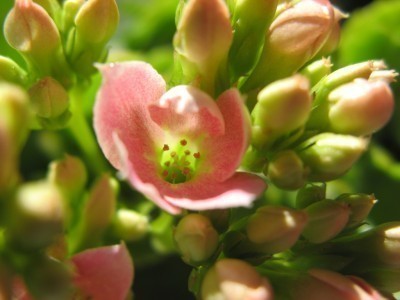






By the time the leaves change and the first storms of winter approach, the intrepid gardener is itching for some living green thing to nurture and bring color to the home. Flaming katy kalanchoe is an ideal plant to chase away the winter doldrums. In most zones the plant is used as an interior plant, but growing flaming katy outdoors is possible in the warmer climates.
The shiny green, scalloped leaves and brilliant flowers enliven any situation and care for flaming katy is a breeze. Discover how to grow flaming katy plants and charge up your interior with some vibrant tones and unique foliage.
Flaming katy is grouped with the succulent variety of plants. This lovely specimen if often found in the gift floral section of your local supermarket or big box nursery, but don’t let its availability fool you. Flaming katy houseplant is a spectacle to behold, especially if you are starved for color and a new plant buddy.
The leaves are thick and waxy like a jade plant but have a sculpted edge. Plants get about 12 inches high and just a little smaller in width. The flowers are a real show stopper in bright colors like pink, yellow, orange and red.
The plants require well drained soil and prefer drier conditions. Flaming katy houseplants that get overwatered will show their displeasure with yellowing, dropping leaves and rotten stems.
Kalanchoe is familiar as a houseplant but it is possible to grow them outside too. They need bright sun and temperatures of 65 to 70 F. (18-21 C.). The plants are native to Madagascar and do not tolerate boggy soil, cold temperatures or shade. Even a light freeze can kill the plant, but it makes an excellent patio plant in summer. Bring it inside when cold temperatures threaten and use it as a houseplant.
Growing this plant from seed is not recommended. Starts are relatively cheap and thrive and grow quickly in sun to part shade. Lower light conditions promote greener foliage and the plants will still fill with blooms. Flaming katy kalanchoe needs at least six weeks of shorter days and up to 12 for more compact blooms.
Use a sandy potting mix for container outdoor plants and amend garden beds with plenty of grit to ensure drainage. You rarely need to water unless you have endlessly hot, dry days. Apply water from the base of the plant to prevent water spotting and rot on the leaves. Allow the top of the soil to completely dry out before watering again.
The importance of not overwatering cannot be stressed enough. The moderate moisture needs of the plant are one of the keys to care for flaming katy.
During the blooming season, fertilize monthly with a diluted flowering plant food.
Remove spent flowers and pinch off any dead leaves to enhance the appearance of the plant. It is a lovely foliage plant even when not in bloom and the thick leaves store moisture. Lightly wrinkled leaves signal that it is time to water.
Follow these hints on care for flaming katy and you will have a proven winner for many seasons to come.
How to Grow and Care for a Primrose Plant
Crazy For Coleus: History and Care
Astilbe: How to Plant, Grow, and Care for Astilbes
Black-eyed Susans: How to Plant, Grow, and Care for Black-eyed Susans
Cannas: How to Plant, Grow, and Care for Canna Flowers
Delphiniums: How to Plant, Grow, and Care for Delphinium Flowers
Copyright © www.100flowers.win Botanic Garden All Rights Reserved